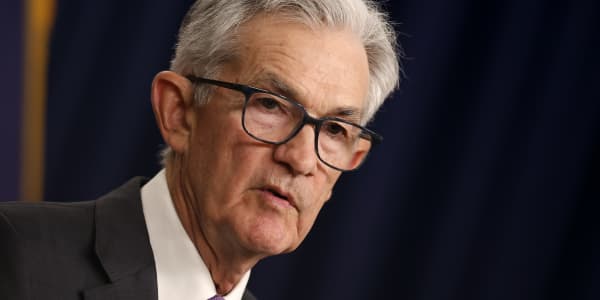This report is from today's CNBC Daily Open, our new, international markets newsletter. CNBC Daily Open brings investors up to speed on everything they need to know, no matter where they are. Like what you see? You can subscribe here.
What you need to know today
Unchanged prices
Prices in the U.S. were flat in October compared with a month ago, according to the consumer price index. Year on year, prices increased 3.2%. Both figures are 0.1 percentage point lower than economists expected. Core CPI, which strips out food and energy, rose 0.2% for the month and 4% for the year — the lowest in two years. Core CPI numbers were also 0.1 percentage point lower than expected.
Boost from CPI
U.S. stocks jumped Tuesday on the cooler-than-expected CPI report, with major indexes notching their best day since April. Meanwhile, Treasury yields tumbled. Celebrating the report as well, Europe's Stoxx 600 climbed 1.34%. Separately, euro zone gross domestic product shrank 0.1% quarter on quarter in the three months ended September.
Halved interest rates?
UBS expects the Federal Reserve to slash interest rates by as much as 275 basis points in 2024, almost four times the market consensus. The federal funds rate is currently between 5.25% to 5.5%. That means the Swiss bank thinks rates will be between 2.5% and 2.75% by next year. Disinflation and rising unemployment are among reasons why the bank thinks the Fed will cut rates so drastically.
36% of revenue
Google pays Apple 36% of its Safari search revenue, confirmed Alphabet CEO Sundar Pichai. The number was revealed — apparently unintentionally — by an expert witness testifying on Google's behalf in antitrust proceedings against the tech firm. But Pichai confirmed the number in a separate lawsuit filed against Google by Epic Games.
[PRO] Massive divergence
There's a massive divergence in markets now, BTIG, a financial services firm, said. Last week, one index closed less than 5% below a 52-week high, while another closed less than 5% above a 52-week low. It's an occurrence that isn't only "extremely rare," but could also signal trouble ahead for stocks.
The bottom line
The word "exuberance" has a negative connotation when used to describe markets. In 1996, Former Federal Reserve Chair Alan Greenspan used the term "irrational exuberance" as an implied warning to the stock market when the dot-com bubble was still inflating. Greenspan, of course, proved prescient.
It's hard to describe yesterday's market movements as anything but exuberant. This time, however, there's a rational basis behind them: Inflation's receding. Prices were unchanged month on month, while the headline core CPI reading for October was the smallest increase in two years.
Chicago Fed President Austan Goolsbee called the report "slow but clear progress" on bringing inflation below 2% — and raised hopes "we may do that with an unemployment rate that never gets above 4 percent."
Goolsbee's comments were measured, as befits a Fed official. Others were more, well, exuberant.
AXS Investments CEO Greg Bassuk called the data an "early holiday present" because it effectively removed any chance the Fed will hike interest rates further. The options market implied a 0.2% chance of a December — or January — hike, according to the CME FedWatch Tool. In fact, markets now think there's a 31.7% chance the Fed will cut rates as early as March.
Indeed, Treasury yields — which reflect investors' expectations of where rates will end up — took a sharp fall in U.S. trading Tuesday. The 10-year yield sank 18 basis points to 4.45% and the 2-year tumbled 21 basis points to 4.83%.
"October's cooler CPI data, combined with a slowing but resilient economy, bodes well for the economy's soft landing, while positioning 2024 for lower interest rates and the prospects for robust stock market growth," Bassuk said.
But we don't have to wait until 2024 to see robust stock growth. The broad-based S&P 500 rallied 1.91%, with all 11 sectors in positive territory. The tech-heavy Nasdaq Composite jumped 2.37% and the Dow Jones Industrial Average added 1.43%. Yesterday was the best showing for the S&P and Nasdaq since April.
Still, as positive as October's CPI report was, we shouldn't forget Fed Chair Jerome Powell's recent warning of "being misled by a few good months of data." The chances that the report was an anomaly are low, it's true. But the line between rational and irrational exuberance can be thin, especially in markets.





